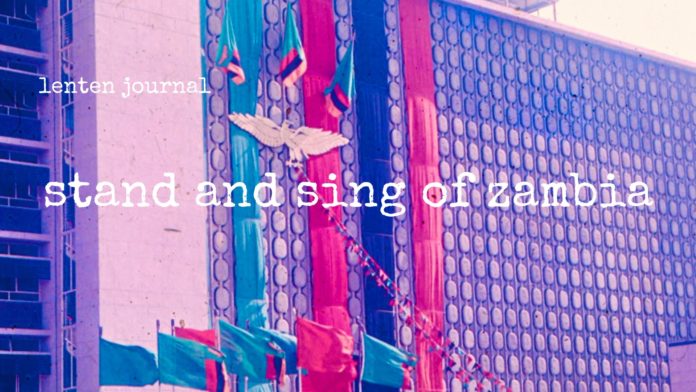In the summer of of 1969, we moved from Lusaka, Zambia to Nairobi Kenya.
I lived in Zambia from first through fifth grade, and then again for seventh grade. When we moved there, it was still the British colony Northern Rhodesia. On October 24, 1964, we participated in the birth of the new nation. I still sing the national anthem for Ginger every October, standing in our living room.
stand and sing of Zambia proud and free
land of work and joy in unity
victors in the struggle for the rights
we’ve won freedom’s fight
all one, strong and free . . .
The song is on my mind because Zambia has found me three times over the last few days. First, in the form of a novel: The Old Drift by Namwali Serpell, a story about Zambia by a Zambian writer. I am only a couple of chapters in, but the writing is brilliant. Take her definition of history, for example:
the word the English used for the record of every time a white man encountered something he had never seen and promptly claimed it as his own, often renaming it for good measure.
The book begins with a prologue of sorts about David Livingstone, the colonialist/missionary/explorer who died in the Eastern Province of Zambia and the Africans who knew him buried his heart there before they sent the body back to England.
My father went to the Eastern Province–a town called Petauke–at the request of a man who was a member of Matero Baptist Church in Lusaka, where we went. Dad told stories of driving until the road ended and then walking for three days to get to the village. Only one person there had ever seen a mazungu–a white man–and she was the oldest person in the village. When she told her story, Dad realized the last European to stand in that place was Livingstone himself.
The second Zambia sighting was an article at 3 Quarks Daily by the travel writer Bill Murray detailing a trip is making by rail from Dar es Salaam, the Tanzanian capital, to Kapiri Mposhi, a town in the Zambian Copper Belt. The 1,100-mile journey wasn’t possible when I lived in Zambia; the rail line was not completed until the 1970s, but reading about it makes me wish I could make the forty-two hour trip.
In the spring of 1969, before we moved north, my mother decided she would take my brother, Miller, and I back to Bulawayo, Southern Rhodesia, which was the first place we lived in Africa, and the place my brother was born. She had a sense it would not be easy to get back there and she wanted us to see a place we had only known as small children. We left when I was five. Her choice of travel was by train, though that trip was only 775 miles, and we didn’t do it all at once.
And she was right: I have never gotten to go back to either Zambia or Zimbabwe.
Which brings me to the third thing. My brother called today for no other reason than we do our best to talk to each other every two or three weeks, and part of what he had to say was he will be in Zambia in April as a part of a trip he and his wife, Ginger, are taking related to their missions nonprofit. They support and work with churches in Malawi and Zambia, so they have been back a few times, and I feel a kind of wistfulness every time they go, wishing I could see our house on Valentine Close, or the one on Harding Road with the big backyard where all the neighborhood kids played softball and soccer.
When I wrote This Must Be the Place: Reflections on Home, I said,
In those days on Harding Road I learned to live in joy, to trust that sadness or difficulty or failure were never the last words. The people at Matero who filled up the room with song were acquainted with grief; they were not naive. Life was hard and God was faithful. Both things were true and they chose to sing about the latter.
When we left Zambia, I left home, but not for the first time, nor the last. I am grateful for the trinity of invitations to go back there through the words and journeys of others. Even from this distance, I can still stand and sing of a place I loved that let me belong.
Peace,
Milton
